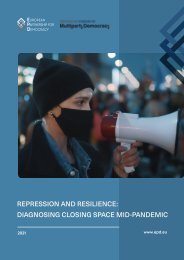Thinking Democratically: A Comprehensive Approach to Countering and Preventing Shrinking Space
Create successful ePaper yourself
Turn your PDF publications into a flip-book with our unique Google optimized e-Paper software.
Campaign finance <strong>and</strong> money in politics<br />
Excessive <strong>and</strong> opaque political party <strong>and</strong> campaign finance – particularly with private sec<strong>to</strong>r funds –<br />
can also skew the political playing field <strong>and</strong> lead <strong>to</strong> corrupt decision-making. The case of El Salvador<br />
is particularly illustrative of the risks of large sums of private sec<strong>to</strong>r money fuelling political party<br />
campaigns. While party financing is provided by the state, the only way <strong>to</strong> overcome the<br />
disproportionately high elec<strong>to</strong>ral barrier <strong>and</strong> nearly impossible procedure for securing accreditation<br />
from the Supreme Court is through large financial investments in campaigning. As a result, political<br />
contenders are incentivised <strong>to</strong> seek <strong>and</strong> accept private sec<strong>to</strong>r financing as well as illegal financing.<br />
This makes political ac<strong>to</strong>rs dependent on <strong>and</strong> accountable <strong>to</strong> those private sec<strong>to</strong>r ac<strong>to</strong>rs funding their<br />
campaign, rather than <strong>to</strong> their elec<strong>to</strong>rate or rank-<strong>and</strong>-file members. This has a very real impact on<br />
policy-making in El Salvador: water exploitation policies <strong>and</strong> the deregulation of water pollution are<br />
a direct result of the sugar sec<strong>to</strong>r’s lobbying <strong>and</strong> financial support <strong>to</strong> ruling parties in the past. 53<br />
Political party <strong>and</strong> campaign finance are regulated very differently in different countries, with some<br />
countries detailing parties’ income <strong>and</strong> expenditures very minutely (e.g. Belgium), <strong>and</strong> others with<br />
no regulation at all (e.g. The Netherl<strong>and</strong>s for local political parties). Even when solid transparency<br />
rules are in place, the case studies of Kenya <strong>and</strong> Indonesia show that they might not necessarily be<br />
enforced at all, or that they are being applied unevenly, due <strong>to</strong> the cooptation or pressuring of the<br />
elec<strong>to</strong>ral management body.<br />
In the absence of party or campaign finance regulations, political parties often resort <strong>to</strong> private <strong>and</strong><br />
even illicit sources of funding for their campaigns. However, a lack of transparency in combination<br />
with high sums of private funding comes with a number of risks for fair elec<strong>to</strong>ral competition <strong>and</strong> the<br />
basic tenets of democratic processes more generally. By the same <strong>to</strong>ken, a lack of transparency<br />
regarding party financing also opens the door <strong>to</strong> criminal networks <strong>and</strong> illicit financing in the political<br />
arena. In Honduras, organised criminal networks have infiltrated in<strong>to</strong> political elites with illicit<br />
financial support, thereby completely dis<strong>to</strong>rting elec<strong>to</strong>ral competition, ensuring impunity <strong>and</strong><br />
coopting officials in local <strong>and</strong> national authorities. Political parties then become even more opaque<br />
in their financing, which impacts their credibility <strong>and</strong> accountability <strong>to</strong>wards citizens. This spiral of<br />
opaque financing has led Guatemalan elections <strong>to</strong> become one of the most expensive in the region.<br />
In Kenya, opaque funding also engenders violence by making it easy for politicians <strong>to</strong> hire private<br />
militias.<br />
The problems with such opaque private <strong>and</strong> illicit finance in political parties are manifold. First of<br />
all, it shrinks the space for contestation <strong>and</strong> limits it <strong>to</strong> only those who can mobilise enough resources.<br />
This creates an uneven space for contestation <strong>and</strong> immediately excludes certain political interest<br />
53<br />
See also this blog from Heleen Schrooyen on water policy <strong>and</strong> the COVID-19 crisis in Central America, available here.<br />
25

















